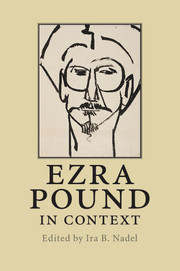Book contents
- Frontmatter
- Contents
- Notes on contributors
- Acknowledgements
- Chronology
- List of abbreviations and note on references to The Cantos
- Introduction
- Part I Biography and works
- 1 Prose criticism
- 2 Poetics
- 3 Translation
- 4 Romance languages
- 5 Letters
- 6 Editor, anthologist
- 7 Education
- 8 Journalism
- 9 Politics
- 10 Economics
- 11 Radio broadcasts
- 12 Law
- 13 Textual criticism
- 14 Archives
- 15 The Lives of Pound
- Part II Historical and cultural context
- Part III Critical reception
- Further reading
- Index
2 - Poetics
Published online by Cambridge University Press: 05 July 2014
- Frontmatter
- Contents
- Notes on contributors
- Acknowledgements
- Chronology
- List of abbreviations and note on references to The Cantos
- Introduction
- Part I Biography and works
- 1 Prose criticism
- 2 Poetics
- 3 Translation
- 4 Romance languages
- 5 Letters
- 6 Editor, anthologist
- 7 Education
- 8 Journalism
- 9 Politics
- 10 Economics
- 11 Radio broadcasts
- 12 Law
- 13 Textual criticism
- 14 Archives
- 15 The Lives of Pound
- Part II Historical and cultural context
- Part III Critical reception
- Further reading
- Index
Summary
THE LUMINOUS DETAILS OF A NEW POETICS
Despite the fact that Pound was prodigiously prolific as a poet, essayist, and letter writer, he wrote no systematic treatise on poetics. Nonetheless, his extensive writings on poetry are often memorable: “Literature is news that stays news” (ABCR, 29); “Artists are the antennae of the race” (ABCR, 73, 81); “Dichten=condensare” (ABCR, 36, 92). But the definition he repeated most often – five times – was one he borrowed from Dante: “Poetry is a composition of words set to music.” Simple as this definition may seem, it contains the nucleus of an entire poetics; that is, it addresses, when fleshed out fully, the essential questions of any poetics: what is the nature of the language from which a poem is made, who makes it, and for what end or purpose? In tapping Dante for this definition, Pound is not simply reaching back to a literary giant to gain authority; he goes to Dante because he believed the definition to be sound and because Dante articulated his definition at what, for Pound, was a crucial turning point in European literary history.
Pound argues that during Dante's time, poets, especially Petrarch, but even Dante himself, stopped making poems in the ancient tradition, started by the Greek lyric poets and extending up through the medieval period. That ancient practice understood poems to be a joining of music and words; neither music nor language predominated – they were simply inconceivable apart from one another. The disruption of this poetics, built around the joining of music and poetry, came when word and sound were separated. Words began to be put in service of philosophical sonnets done in the ornamental style of Petrarch while sounds became strictly the province of musical pieces such as the sonata (LE, 91).
- Type
- Chapter
- Information
- Ezra Pound in Context , pp. 23 - 32Publisher: Cambridge University PressPrint publication year: 2010

